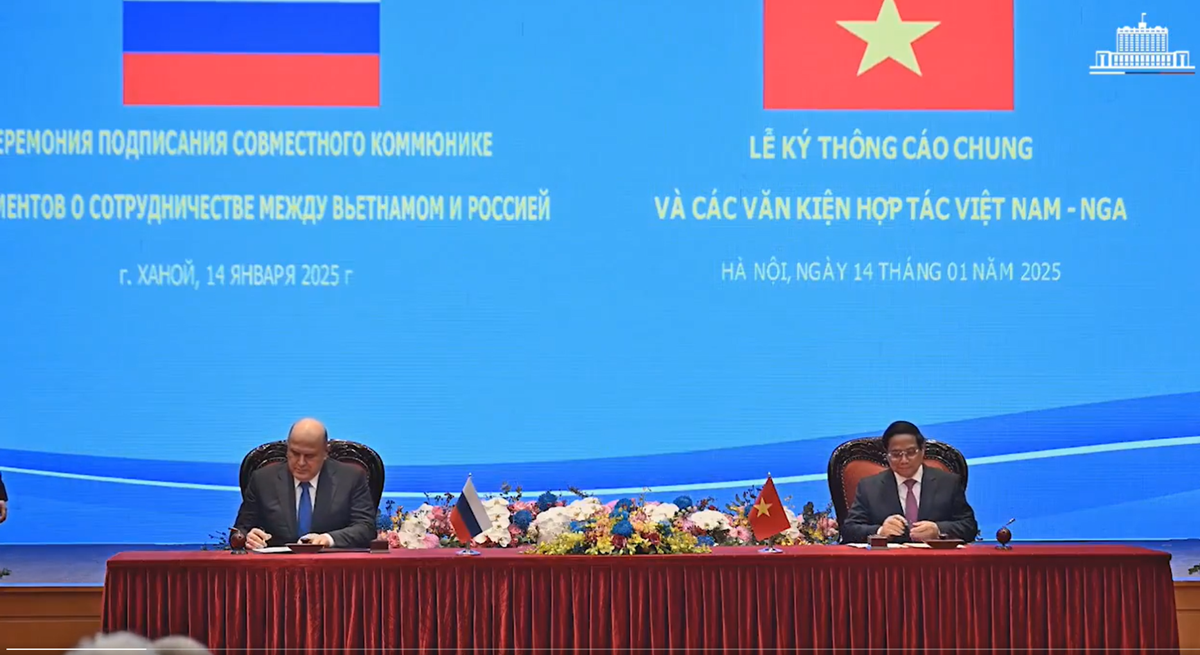Hanoi signs agreement with Russia's Rosatom on nuclear energy
The pact was signed by Russian Prime Minister Mishustin on a visit to the Vietnamese capital. Cooperation agreements also in the digital economy and wireless communications. The aim is to strengthen bilateral trade, which between the two countries amounted to just .6 billion in 2023. Moscow seeks new markets to circumvent Western sanctions.
Hanoi (AsiaNews) - After having played the atomic energy card in an attempt to revive alliances in the Middle East, especially in Turkey, Russia is looking for new alliances in Asia. This is the background to the signing yesterday, 14 January, of a nuclear agreement between Moscow and Hanoi, in addition to other cooperation contracts between the two countries.
The pact was signed by Russian Prime Minister Mikhail Mishustin, who is currently visiting the Vietnamese capital, a country that wants to relaunch ambitious nuclear energy programmes that have been suspended for years in an attempt to meet domestic needs, particularly in the industrial sector.
In a framework of complicated regional and global alliances, Hanoi has so far been able to forge and maintain close relations with Moscow, Washington and Beijing. Moreover, Russia has long been the main supplier of military equipment, just as Russian oil and gas giants have operated in large portions of the South China Sea, including areas claimed by China.
Yesterday's agreement, the contents of which remain secret, was signed by the heads of Rosatom (Russia's state-owned atomic energy company) and Vietnam's state-owned electricity company Evn, who agreed to strengthen cooperation in the energy sector.
Vietnam is seeking to revive plans on civil nuclear power, after shelving the construction of two nuclear power plants in 2016 due to rising costs and safety concerns. The aim is to help make the country energy efficient and meet the target of reducing additional greenhouse gas emissions by 2050.
Russian PM Mishustin also held bilateral talks with his counterpart Pham Minh Chinh and met with Vietnamese Communist Party chief To Lam and Vietnamese National Assembly Speaker Tran Thanh Man, while he will see President Luong Cuong today.
‘Vietnam is an important partner of Russia in Southeast Asia,’ said Mishustin on his first trip to the Southeast Asian country, who added that “today we intend to discuss a comprehensive plan of cooperation between Russia and Vietnam, which will last until 2030”.
A cooperation that will certainly not be appreciated by the US, which has imposed dozens of sanctions on Rosatom subsidiaries and senior officials branded by the Russian energy giant as ‘unfounded and illegal’ and a ‘form of unfair competition’ by the US.
Meanwhile, Moscow has also agreed to transfer a maritime research vessel to Vietnam, according to an agreement signed by the Hanoi Ministry of Defence and the Russian Ministry of Science. Added to this are cooperation agreements in the digital economy and wireless communications.
Rosatom General Director Alexey Likhachev also arrived in Hanoi in recent days to reiterate the company's commitment to build nuclear power plants and share Moscow's knowledge in the field.
The Asian market represents an important outlet for developing new relations and compensating for the growing international isolation linked to the war in Ukraine. In June, Russian President Vladimir Putin also visited Vietnam to agree on a roadmap for work in the field of atomic science and technology.
Hanoi and Moscow have had diplomatic relations since 1950 and have been close allies since the Cold War. Bilateral trade was only .6 billion in 2023, compared to 1 billion with China and 1 billion with the US. And while Russia has accounted for 80% of Vietnam's arms exports since the early 2000s, this percentage has declined over the years due to Hanoi's attempts to diversify supplies.
27/03/2023 13:54







.png)










